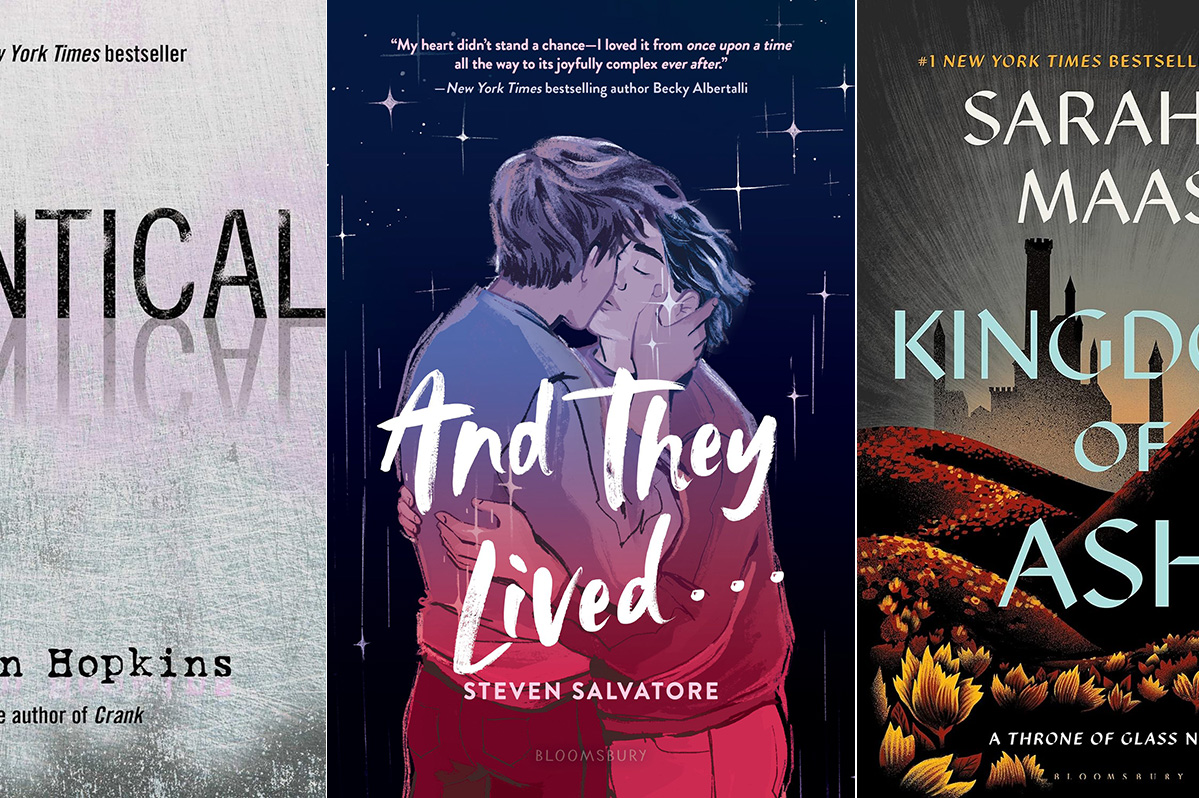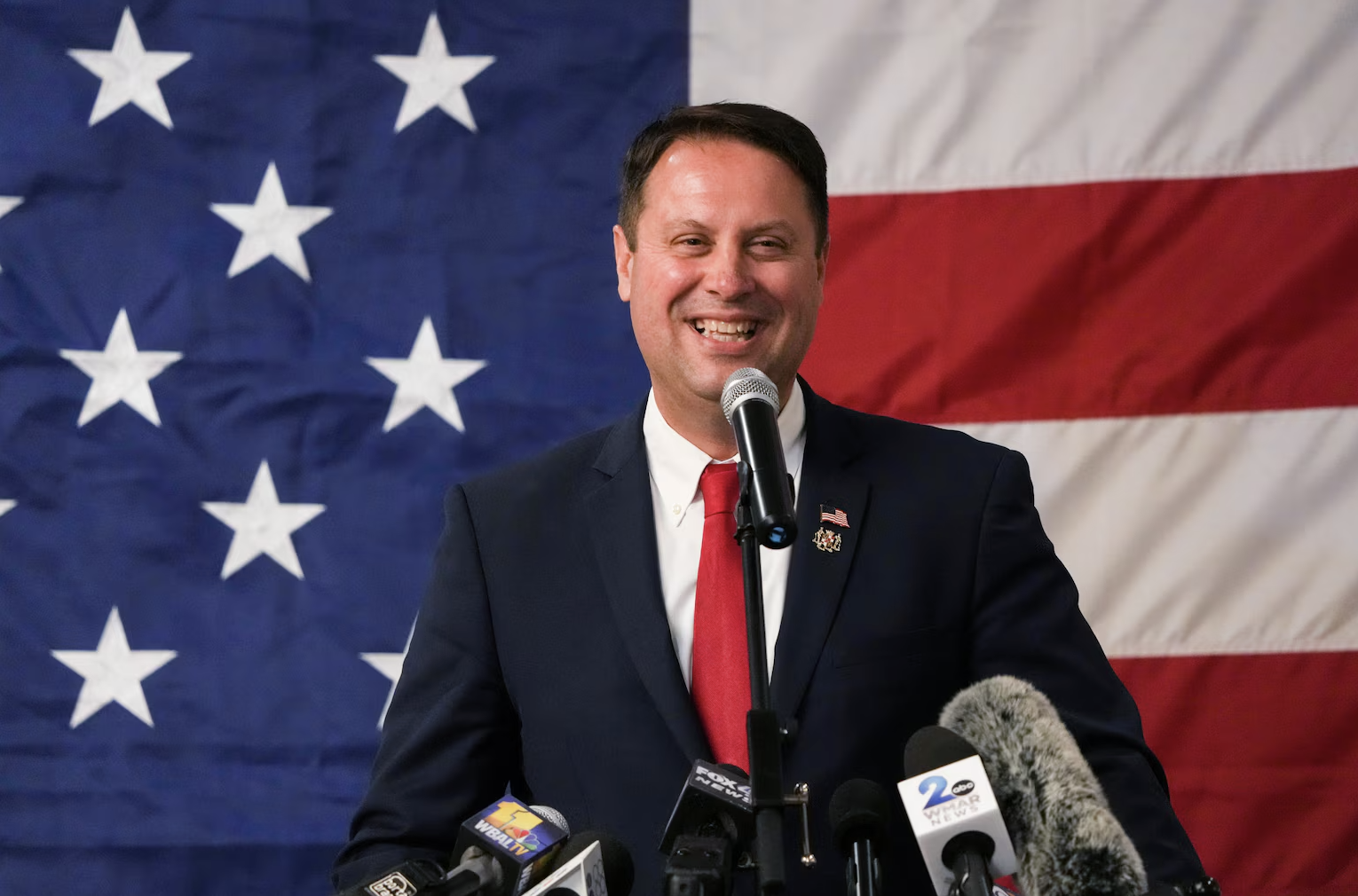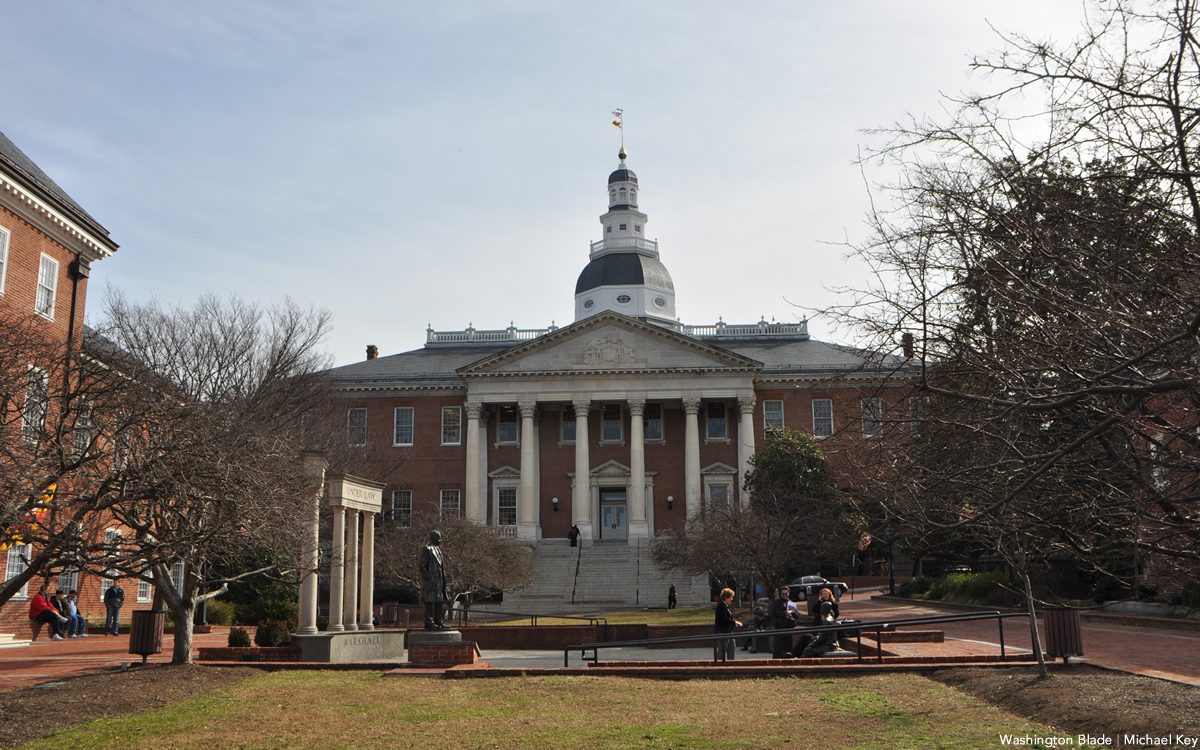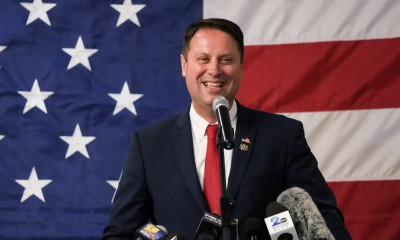Maryland
Support for book bans varies in Md. school board races
New state law fails to protect majority of targeted titles

Colt Black is many things: a mortician, an emergency medical technician, a firefighter, a father, a husband and a candidate for the Frederick County Public School Board. He’s also a self-professed First Amendment absolutist.
So, when Black was asked about what material should be available to Frederick County students in their school libraries, his response followed suit.
“I don’t support book bans,” he said.
Yet like many Maryland school board candidates, Black’s detailed views on the book issue are nuanced. In his vision for Frederick County Public Schools, any book, whether it be instructional or recreational, would be reviewed in committee and public hearings before making its way onto school shelves.
“Books which contain extreme violence or are sexually explicit, which glorify these things with no academic value, should be removed,” Black said in response to a University of Maryland Local News Network questionnaire sent to all 109 school board candidates in the state. “All books, both instructional and library resources, should be reviewed by a committee and public comment accepted before allowing them or disallowing them in the educational setting.”
Black’s support for such a process isn’t unique in his county, or Maryland at large. Asked in a Local News Network survey if they favored book bans, 38 of the 74 candidates who responded to the LNN questionnaire said they favor a policy in which professionals are involved in making sure books are age-appropriate. Another 19 strongly opposed book bans without citing policies for reviewing books.
“I will vote against book bans and the editing of curriculum based on personal beliefs,” said Sarah J. McDermott, who is running for the school board in Anne Arundel County’s District 4. “No topic should be banned from curriculum or libraries, provided that they are age appropriate, and I really trust our librarians and educators to determine that for their students.”
However, 17 candidates were open to banning books that parents find objectionable.
“I am running for the Board of Education because I would like to review our curriculum and establish age-appropriate educational materials for K-12 and eliminate any materials that sexualize children and are not appropriate for minors,” said Elena Brewer, a school board candidate from St. Mary’s County. Brewer is one of 19 candidates in the state that won an endorsement from the 1776 Project PAC, a conservative group whose founder, Ryan James Girdusky, says on the group website that he created the PAC after objecting to books on race issues that a teacher read to his godson’s class.
A patchwork of policies
Amid parents, activists and school boards challenging books across the state, Gov. Wes Moore signed the Freedom to Read Act into law earlier this year in an attempt to put an end to book bans in Maryland public schools.
The law prohibits public schools from excluding or removing materials from their school libraries because of the origin, background or views of the author. It also states that material cannot be removed because of partisan, ideological or religious disapproval. School systems must adopt book review policies where challenged books remain on the shelves until the review process concludes.
However, the legislation fails to affect the majority of books banned throughout the state. According to Steve Wernick, the director of curriculum and instruction for Carroll County Public Schools, the bill only mandates that counties have adequate processes in place for the removal of library content – and because Carroll County already had a committee in place that had banned books, its decisions stand.
A unanimous school board vote removed more than 60 books in Carroll County – 21 permanently. The banned titles include:
• “And They Lived,” a gay-themed young adult novel by Steven Salvatore.
• “Identical” by Ellen Hopkins, a novel about a young woman sexually abused by her father.
• “Kingdom of Ash,” “House of Earth and Blood,” and “A Court of Frost and Starlight” – popular fantasy novels by Sarah J. Maas.
Meanwhile, Wicomico County banned “All Boys Are Blue,” George M. Johnson’s coming-of-age novel about a young queer boy. Frederick County banned Hopkins’ “Triangles,” which publisher Simon & Schuster described as a “surprisingly erotic” novel that includes adultery about three women’s intersecting friendships
And Queen Anne’s County banned “Harbor Me,” Jacqueline Woodson’s novel about multicultural kids navigating their way through a multitude of problems, which was a New York Times Book Review’s “Kids Notables” selection for 2018.
With November’s school board elections approaching, the issue of book bans will once again appear on the ballot in the form of races between conservative candidates and their opponents. Candidates endorsed by the conservative 1776 Project PAC are running in nine Maryland counties.
The Carroll County precedent
In Maryland’s largely liberal central corridor, Carroll County has always been an outlier. Jutting southward from the Mason-Dixon line, it’s surrounded by liberal enclaves and Frederick County, a former Republican stronghold that flipped blue in the 2020 presidential election for the first time since 1964.
As demographics shift and the Democratic party strengthens its regional claim, Carroll County remains stubbornly independent. While it isn’t uncommon to have a couple of books challenged over the course of a year, Carroll County’s 21 permanent removals drew headlines earlier this year.
One of the county’s board of education candidates, Amanda Jozkowski, said she opposes such actions.
“While there may be rare instances where a book is deemed unsuitable for the school library, these decisions should be based on clear, consistent criteria focused on educational value, not on censorship or ideological preferences,” she said in responding to the candidate questionnaire.
Jozkowski said Carroll County is a proving ground for conservative policies – especially within schools. She noted that the county has a large and active Moms for Liberty chapter that is helping chapters in other counties. Moms for Liberty, a conservative group that stresses parents’ rights, burst onto the scene in 2021 and has led the fight for book bans in many school districts.
To offer a different future for Carroll County educators and students, Jozkowski is collaborating with fellow board candidate Muri Lynn Dueppen on the Slate for Student Success, a joint candidacy that highlights the pair’s shared values and encourages voters to mark their names at the top of November’s ballot. On its website, opposition to book banning is listed as one of the pair’s core values.
Jozkowski hopes that voters see her as an alternative to the conservative candidates she opposes. She said she believes that many Carroll County residents are tired of the “politically motivated orientation” of the current school board.
But, in a county that hasn’t voted for a Democratic presidential candidate in 60 years, her success is far from guaranteed. Among her challengers is Kristen Zihmer, a 38-year-old small business owner who called herself a “conservative lifelong resident” of Carroll County and who, according to the Baltimore Sun, has been endorsed by Moms for Liberty.
Zihmer listed Ronald Reagan as the political figure she admired most and said: “My goal is to uphold the family and community values that make our county exceptional.” Asked about book bans, she said: “When materials are open to question, I default to parental consent…I would state unequivocally that I do not condone materials that are sexually gratuitous in nature or feature extreme sexual content.”
A debate in Howard County
In March, the Howard County chapter of Moms For Liberty laid out plans for its latest initiative: the elimination of 46 books from Howard County Public Schools’ shelves, following in Carroll County’s footsteps.
While the chapter’s measures have failed thus far, one of its founders is now running for a spot on the county’s board of education. Trent Kittleman, a former state delegate who lost re-election in 2022, requested to be taken off the Moms for Liberty rolls when she began her school board campaign, Baltimore Fishbowl reported in March.
But her views on the issue remain staunchly conservative. She decried a 2021 ban on six Dr. Seuss books with harmful stereotypes, but she remains concerned about other kinds of books.
“The misnomer ‘book banning’ being criticized these days is an effort by many parents to have certain books removed from school libraries due to what they consider explicitly sexual content,” Kittleman said in response to a Local News Network questionnaire. “It is not unreasonable to have explicitly sexual content ‘that serves no redeeming social purpose,’ removed from the schools.”
Kittleman offers the Democratic stronghold a new vision for its public schools, one in line with the Republican values she touted during her eight years in the Maryland House of Delegates. One of her opponents, incumbent Jen Mallo, offers the opposite.
“A diverse and inclusive set of library books are critical to have in our schools,” said Mallo, who chairs the Howard County Board of Education. “We need to actively work to include these materials despite extremist fear mongering and demands for removal.”
The issue goes to court
Montgomery County’s battle between conservative parents and school board members looks a little different than those in the rest of the state. In September, a group of parents filed a petition asking that the Supreme Court review the school board’s refusal to allow parents to opt their elementary children out of classes using LGBTQ+ books, citing a violation of their First Amendment rights.
The books are part of the district’s effort to be more inclusive by adding titles with LGBTQ characters in their kindergarten through 12th-grade curriculum.
Brenda M. Diaz, one of the county’s school board candidates, is siding with those parents.
Diaz, a social studies teacher at Fusion Global Academy with more than 20 years of education experience, said that since Maryland state law allows parents to request exemptions for their children from certain portions of the sex education curriculum, she would extend these same rights to parents for books their children can access.
“Each school should be able to determine with their body of parents which books should be removed,” she said in her response to the LNN candidate questionnaire.
Yet Lynne Harris, a board member running for re-election in Montgomery County, believes public opinion shouldn’t be a factor when determining which books students can access
Harris, currently the vice president of the Montgomery County Board of Education, strongly supports the county’s LGBTQ+ curriculum.
“If families want to restrict the books their students read, they have many avenues to do that,” Harris told the Local News Network in August, “but imposing these choices and personal judgments on thousands of others is not appropriate.”
(Courtesy the Capital News Service)
Maryland
4th Circuit dismisses lawsuit against Montgomery County schools’ pronoun policy
Substitute teacher Kimberly Polk challenged regulation in 2024

A federal appeals court has ruled Montgomery County Public Schools did not violate a substitute teacher’s constitutional rights when it required her to use students’ preferred pronouns in the classroom.
The 4th U.S. Circuit Court of Appeals in a 2-1 decision it released on Jan. 28 ruled against Kimberly Polk.
The policy states that “all students have the right to be referred to by their identified name and/or pronoun.”
“School staff members should address students by the name and pronoun corresponding to the gender identity that is consistently asserted at school,” it reads. “Students are not required to change their permanent student records as described in the next section (e.g., obtain a court-ordered name and/or new birth certificate) as a prerequisite to being addressed by the name and pronoun that corresponds to their identified name. To the extent possible, and consistent with these guidelines, school personnel will make efforts to maintain the confidentiality of the student’s transgender status.”
The Washington Post reported Polk, who became a substitute teacher in Montgomery County in 2021, in November 2022 requested a “religious accommodation, claiming that the policy went against her ‘sincerely held religious beliefs,’ which are ‘based on her understanding of her Christian religion and the Holy Bible.’”
U.S. District Judge Deborah Boardman in January 2025 dismissed Polk’s lawsuit that she filed in federal court in Beltsville. Polk appealed the decision to the 4th Circuit.

By PAMELA WOOD | Dan Cox, a Republican who was resoundingly defeated by Democratic Gov. Wes Moore four years ago, has filed to run for governor again this year.
Cox’s candidacy was posted on the Maryland elections board website Friday; he did not immediately respond to an interview request.
Cox listed Rob Krop as his running mate for lieutenant governor.
The rest of this article can be found on the Baltimore Banner’s website.
Maryland
Expanded PrEP access among FreeState Justice’s 2026 legislative priorities
Maryland General Assembly opened on Jan. 14

FreeState Justice this week spoke with the Washington Blade about their priorities during this year’s legislative session in Annapolis that began on Jan. 14.
Ronnie L. Taylor, the group’s community director, on Wednesday said the organization continues to fight against discrimination against people with HIV/AIDS. FreeState Justice is specifically championing a bill in the General Assembly that would expand access to PrEP in Maryland.
Taylor said FreeState Justice is working with state Del. Ashanti Martinez (D-Prince George’s County) and state Sen. Clarence Lam (D-Arundel and Howard Counties) on a bill that would expand the “scope of practice for pharmacists in Maryland to distribute PrEP.” The measure does not have a title or a number, but FreeState Justice expects it will have both in the coming weeks.
FreeState Justice has long been involved in the fight to end the criminalization of HIV in the state.
Governor Wes Moore last year signed House Bill 39, which decriminalized HIV in Maryland.
The bill — the Carlton R. Smith Jr. HIV Modernization Act — is named after Carlton Smith, a long-time LGBTQ activist known as the “mayor” of Baltimore’s Mount Vernon neighborhood who died in 2024. FreeState Justice said Marylanders prosecuted under Maryland Health-General Code § 18-601.1 have already seen their convictions expunged.
Taylor said FreeState Justice will continue to “oppose anti anti-LGBTQ legislation” in the General Assembly. Their website later this week will publish a bill tracker.
The General Assembly’s legislative session is expected to end on April 13.
-

 Baltimore4 days ago
Baltimore4 days ago‘Heated Rivalry’ fandom exposes LGBTQ divide in Baltimore
-

 Real Estate4 days ago
Real Estate4 days agoHome is where the heart is
-

 District of Columbia4 days ago
District of Columbia4 days agoDeon Jones speaks about D.C. Department of Corrections bias lawsuit settlement
-

 European Union4 days ago
European Union4 days agoEuropean Parliament resolution backs ‘full recognition of trans women as women’



















